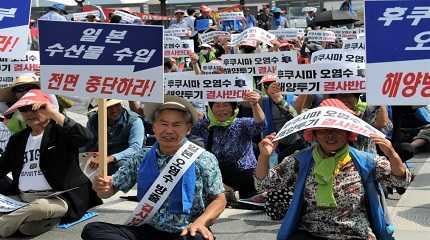
GOHEUNG, South Korea, Aug. 16 (Xinhua) -- Over 1,000 South Korean fishermen in the southern coastal county of Goheung gathered on Wednesday as part of the recent rallies among domestic fishermen to oppose Japan's planned discharge of radioactive wastewater into the ocean.
The participants shouted slogan of "Dead against dumping Fukushima nuclear-contaminated wastewater into ocean," holding placards that read "The ocean belongs to all humankind" and "Nuclear-contaminated wastewater dumping is an irresponsible nuclear attack."
"We fishermen, who have only depended on the sea all our lives and have continued our lives through the sea, feel despair beyond the fear that all the fishery products, which we fish and farm by sweating day and night, would not be sold while the sea, or the base of our lives, will be contaminated," the fishermen said in a statement.
The protesters stressed that if the radioactive wastewater is released into the ocean, damage would be done to all the ecosystems in the Pacific Ocean and all fishermen living on it.
Amid wide criticism from both home and abroad, the Japanese government has been pushing to dump the nuclear-contaminated wastewater this summer from the crippled Fukushima Daiichi nuclear power plant, which was hit by a massive earthquake and an ensuing tsunami in March 2011.
"If the nuclear-contaminated wastewater is discharged into the sea, the marine ecosystem will not only be destroyed, but also radioactive marine products will not be eaten or sold," Park Hyung-geun, a director at the Goheung branch of the National Federation of Fisheries Cooperatives, told Xinhua.
"So, won't all fishermen die from the severe loss of livelihood? In order to prevent it and survive, we fishermen will protect our right to live until the end together," Park said.
Park noted that there were few customers at seafood-related restaurants during this year's summer vacation season, adding that revenue of the restaurants halved compared to the same season of last year.
According to a survey of 1,000 South Korean adults in May, 85.4 percent opposed Japan's radioactive wastewater discharge, while 72 percent said they would reduce the consumption of marine products if the wastewater is dumped into the ocean.
"It's very inappropriate and I think it's an international crime. The obligation to provide information for neighboring countries and preserve the marine ecosystem is now being acknowledged in the UN Convention on the Law of the Sea and the London Convention," Kim Yong-min, lawmaker of the main opposition Democratic Party, told Xinhua.
"I think (Japan) has definitely been in violation of international law since it ignored all the procedures and obligations," the legislator noted.
"I believe the United States should make this issue public and clarify its opposition. But I'm very critical of it because I think the United States as a member of the international community didn't take an important responsibility for it," Kim added.




